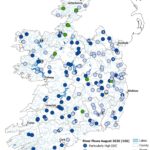The Hydrology Bulletin for August is now on the EPA…
Ireland’s Environment: an Integrated Assessment 2020
On 25 November the EPA published Ireland’s Environment – An Integrated Assessment 2020 which provides an assessment of the overall quality of Ireland’s environment, the pressures being placed on it and the societal responses to current and emerging environmental issues.
Ireland’s Environment: An Integrated Assessment 2020 reveals that enduring and systemic challenges are putting pressure on the environment and remain to be solved. These cut across different environmental topics such as climate, air, soil, water, biodiversity and waste, and across organisations and sectors, business and all levels of society.
The overall quality of Ireland’s environment is not what it should be, and the outlook is not optimistic unless we accelerate the implementation of solutions across all sectors and society.
Laura Burke, EPA Director General launching the EPA seventh State of the Environment Report today
Specific examples include:
- Almost ninety per cent of our energy is generated from fossil fuels giving rise to greenhouse gases
- air quality in some urban areas doesn’t meet WHO standards
- nature and habitats are being damaged (85% of EU listed habitats are in unfavourable condition)
- wetland bird species, such as curlew, are under threat as a breeding species
- raw sewage is being discharged to water from 35 towns and villages;
- even more stark is the dramatic reduction in the number of Ireland’s most pristine rivers, which have fallen from over 500 sites to only 20 sites in 30 years
- nutrient concentrations in rivers and nutrient inputs to the marine environment are increasing
- more than one million tonnes of food waste is generated each year in Ireland
- littering remains a problem, resulting in thousands of complaints annually to local authorities
A key message from Ireland’s Environment: An Integrated Assessment 2020 is that the absence of an overarching national environmental policy position is negatively impacting on success across multiple environment-related plans and policies: the sum of the parts does not make up a coherent whole.
Environmental issues and challenges such as climate change, air quality, water quality and biodiversity cannot be looked at in isolation, as they are complex, interconnected and need to be tackled in an integrated way. Now is the time for an overarching environmental policy position for Ireland – to be clear on our ambition to protect Ireland’s environment in the short, medium and long-term and on our commitment to live up to the image of a Clean Green Island. We need to see a decade of action in the 2020s. A policy position would provide a national vision that all government departments, agencies, businesses, communities and individuals can sign up to, to play their part in protecting our environment.
In addition to such a policy position, our report also calls for better implementation and delivery of existing legislation and policies. Many plans and programmes are already in place which, if fully implemented, would go a long way towards resolving persistent environmental issues. Full implementation of, and compliance with, legislation is a must to protect the environment.
EPA Director, General Laura Burke
In relation to greenhouse gas emissions, the report’s data confirms Ireland’s underachievement in curbing emissions and meeting stated targets. It shows that the longer we delay, the more difficult it will become to turn things around to meet our obligations. It is more than meeting targets, the real goal for Ireland in the face of climate disruption is to have a resilient and stable society and economy, one that is carbon neutral through its own efforts and natural attributes.
The report has also found that nature and wild places in Ireland are under unprecedented pressure and need to be better safeguarded, both locally and in protected areas. Our action to protect nature needs to be more ambitious. We need to identify the pathway to transformative change for nature protection in Ireland and reverse wider current trends in biodiversity and habitat loss.
Very topically, the EPA report highlights people’s greater awareness about the positive benefits of a clean environment for health and wellbeing. The coronavirus (COVID-19) crisis has shown people the importance of the natural environment in their local areas.
“Ireland is already losing much of what is important in its environment. Unspoilt areas are being squeezed out and we are losing our pristine waters and the habitats that provide vital spaces for biodiversity. Now, more than ever, Ireland’s green and blue spaces, which include urban parks, coasts, lakes, rivers, forest and bogs, are essential components of our health infrastructure. These allow people to get out in nature and away from everyday stresses, to the benefit of health and wellbeing and they need to be clean and protected. An investment in the environment is also an investment in our health.”
Dr Micheal Lehane, Director of the EPA’s Office of Environmental Assessment
Ireland’s Environment – an Integrated Assessment 2020 key messages:
The key messages are:
We need vision and implementation to protect Ireland’s environment and our health and wellbeing.
- SOE 1: Environmental Policy Position A national policy position for Ireland’s environment.
- SOE 2: Full implementation Full implementation of existing environmental legislation and a review of the governance around the coordination on environmental protection across public bodies.
- SOE 3: Health and Wellbeing Protecting the Environment is an Investment in Our Health and Wellbeing.
Step up to protect the environment around us as it is under increasing threat
- SOE 4: Climate Systemic change is required for Ireland to become the climate-neutral and climate-resilient society and economy that it aspires to be.
- SOE 5: Air Quality Adoption of measures to meet the World Health Organization air quality guideline values should be the target to aim for in the Clean Air Strategy.
- SOE 6: Nature Safeguard nature and wild places as a national priority and to leave a legacy for future generations.
- SOE 7: Water Quality Improve the water environment and tackle water pollution locally at a water catchment level.
- SOE 8: Marine Reduce the human-induced pressures on the marine environment.
System Change – delivery on sectoral and societal outcomes needs to be accelerated
- SOE 9: Clean Energy Ireland needs to move rapidly away from the extensive use of fossil fuels to the use of clean energy systems.
- SOE 10: Environmentally-sustainable Agriculture An agriculture and food sector that demonstrates validated performance around producing food with a low environmental footprint.
- SOE 11: Water Services Drinking water and wastewater infrastructure must meet the needs of our society.
- SOE 12: Circular Economy Move to a less wasteful and circular economy where the priority is waste prevention, reuse, repair and recycling.
- SOE 13: Land Use Promote integrated land-mapping approaches to support decision-making on sustainable land use.
The report has also recommended that any post-COVID-19 stimulus package for economic recovery should to be developed through a ‘green investment’ lens. This can yield substantial economic returns and avoid spend that locks Ireland into carbon-intensive and otherwise unsustainable consumption and production patterns.
Learn more:
This comprehensive State of the Environment Report is available to download from the EPA website.







